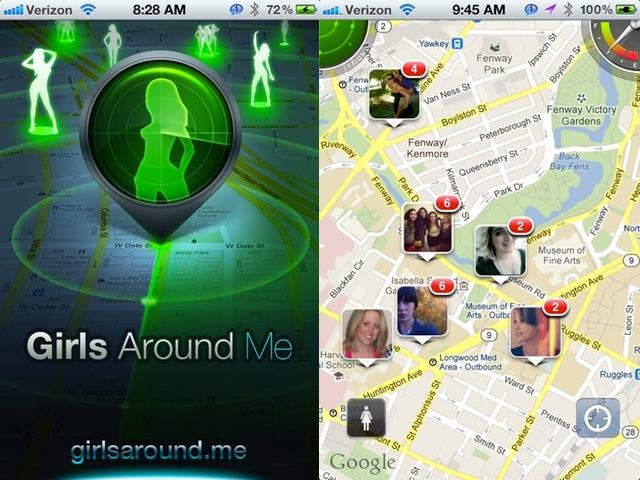4 April — The meteoric rise of iPhone App Girls Around Me to, well, deletion… has been the buzz of the blogosphere this week. But have many well meaning bloggers gotten the analysis of this techno-cultural issue completely wrong? Many posts have decried the invasion of privacy, even though the app only mashed up two streams, Facebook and Foursquare, that users had previously made public. Kashmir Hill at Forbes finally got the privacy issue right, and Nathan Jurgenson at The Atlantic took the discussion to the gender and objectification space where it is arguably best understood.
On Monday Kashmir Hill argued that while respecting your privacy is important, deciding for you that you will have privacy you explicitly didn’t ask for is itself a sort of invasion:
‘You’re too public with your digital data, ladies,’
may be the new
‘your skirt was too short and you had it coming.’— Kashmir Hill
On Tuesday Nathan Jurgenson argued that privacy was the wrong frame of consideration. That yes as many have noted, the Girls Around Me app was “creepy” but not because it mashed up 2 public streams, but because it treated women as objects:
The data angle only explains why an app locating people might exist, but without mentioning the politics of all of this we are not addressing why the app is gendered the way it is, the coding and design choices that were made as well the real consequences this kind of app has…
Another consequence of the trend to only talk about data and not society, norms, politics, values and everything else confusing about the analogue world is the victim-blaming implicit in most of these articles. The cause of the problem? Women sharing data. The solution? Women need to better control their data
— Nathan Jurgenson
This clearly is a “technology” story in that it was a Foursquare + Facebook mashup app from the app store that is the topic… but perhaps the problem with much of the analysis was that it was done from a technology perspective where concepts like “privacy” are well known, but where fundamental cultural ideas like “sex role stereotypes,” “gender tropes,” and “objectification” are not generally considered. Interestingly enough, in a talk last week, Virginia Heffernan of Yahoo News argued:
Every year I become more convinced that technology is actually the masculine form of the word culture; that if you want to talk to men about culture you tell them you’re talking about technology and they’re suddenly calm.
— Virginia Heffernan

While enough people managed to stop watching Kony 2012 long enough to complain about Girls Around Me and cause Foursquare to revoke the app’s access, it seems likely that so long as we are biologically based cyborgs and not robots, apps like Girls Around Me will appear again. Is this bad? Hill suggests that if it’s consensual, there isn’t a problem. But Jurgenson sees a harmful social impact when apps treat women like game pieces to be collected.
Earlier today I was talking to a group of students and asked them if they thought students in 2022 would have an educational experience mostly similar or mostly different from the one they’re having today. About 75% of them thought it would be mostly different. “How?” I asked and several said it would be all online learning. “And that will be better or worse?” I followed, and they almost unanimously said, oh, it will suck! How crazy that they feel resigned that techno-culture will inevitably lead us to a place where we don’t want to be.
When George W. Bush decided that America didn’t need so much science, wouldn’t grant visas to foreign scientists, and definitely didn’t want to do stem cell research, he created the largest wave of scientists emigrating from America to Europe and elsewhere since half a century earlier when Adolph Hitler effectively sent a wave of scientists from Europe to America.
Ideas, both empowering ones and horrific ones, will always find a way of expressing themselves.
As river rafters of techno-culture, our journey is more about the river than it is about us. Still, if you see a big rock in front of you, paddling a little to the left or right could result in a very different journey.

• Nathan Jurgenson’s post at The Atlantic
• Kashmir Hill’s post at Forbes
• Virginia Heffernan’s “The Digital Dialectic” talk at the Berkman Center

I didn’t even know about this app until now. Quite amazing, or should I say horrifying, that two services combined results in something this creepy. Creepy was indeed what came to my mind too when reading about it, I mean, just look at the graphic design for the app – girls making … what is that? stripper/playboy poses. Looks like it’s based on the idea that men are inherently predators locating and targeting the passively awaiting female prey.
The Virginia Heffernan quote was so spot on. Reminded me of this Sociological Images post that might be relevant to this topic:
http://thesocietypages.org/socimages/2010/12/22/science-technology-and-the-male-gaze/